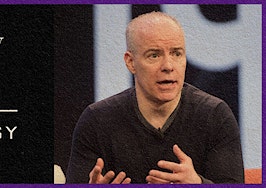The Inman community will gather virtually for Connect, June 15-17. It’s a powerhouse lineup of speakers, and our focus is on the New Normal: what business looks like on the other side of the pandemic. Let this conversation with one of our June Connect speakers serve as an appetizer, and don’t forget to grab your ticket to June’s Inman Connect before prices go up.
Over the past year, the coronavirus pandemic has upended the real estate industry in a plethora of ways. From drive-thru closings to record-low mortgage rates and accelerated movement from the cities to the suburbs, real estate agents and leaders have been stretched to unimaginable levels just to help buyers and sellers achieve their goals.
As the vaccine rollout continues and cities reopen, everyone’s attention is figuring out what pandemic-induced changes will fade away or continue to stay.
For Realogy CEO Ryan Schneider, the adoption of hybrid workspaces and transaction experiences are the key to success now and in the future, as the nation gears up for more economic, generational and public health shifts.
What do you think ‘the new normal’ for real estate is? There’s been so many changes during the pandemic, but which ones are poised to stick around?
The new normal starts with the enduringness of the consumer changes that are happening. The new normal is going to include people working differently and it’s going to include people living in different places. For example, we’re seeing people move to some of the attractive tax and weather destinations, such as Texas and Florida.
All of that comes together to likely be a positive for housing as it sparks higher housing demand than we’ve had in the past. For Realogy, as a market leader in residential real estate, we benefit very substantially from that.
For ourselves, our trend of driving growth in our business, using technology well, and generating great financial results [has been great for] our bottom line and market share gain. I believe Realogy is powerfully positioned to benefit from these new [consumer trends].
Migration trends have been a big topic at Inman. How can brokerages help their agents deal with this great reshuffling and empower them to serve clients who are making moves to other cities or states?
First, I want to say agents I think are awesome and they’ve really shown their value both during the COVID downturn and afterwards with how flexible and powerful they’ve been helping customers get deals done safely both in their local markets and beyond.
Secondly, one of the most powerful things to deal with the consumer changes that you’re talking about is the power of both having a huge scale business and having great brands, like we have at Realogy. What we’re increasingly finding is the power that agents can provide customers, especially if they’re leaving one market going to another, comes through our network.
Our agent-to-agent referrals across geographies has really gone up. Any one individual agent’s ability to cover the whole country is going to be very limited. But if you’re part of something, whether it’s Sotheby’s International Realty, Coldwell Banker or ERA, where there’s referral opportunities for agents and brokerages between those networks, that’s the way you can best cover the country.
I’d like to focus on remote work. The shift to remote work has inspired buyers to move back to their hometowns or other more affordable markets. However, according to a few news reports I’ve read, some employers are reversing their thoughts on a remote workforce. How could that impact the migration trends we’ve seen over the past year?
Well, let me let me start with the 10,000 employees at Realogy. We have thousands of our employees who through the pandemic have been in the offices or out there in the field because that’s what you’d have to do to support agents, brokerage partners, franchisees and customers, right? That commitment to serving customers and agents is not going to change for our company.
What has changed for our company, which you alluded to, is what’s happening beyond just the customer-facing and agent-facing things. We’ve found some back office jobs that can be permanent work-from-home and we’ve made them permanent work-from-home [positions] because the productivity is just as high or higher [than being in the office]. The employees like it better and their life is better with less commuting, and it’s a good move for us from a real estate cost and other standpoints.
The other move we’ve made and this impacts a couple thousand employees [at HQ], is a move to a hybrid world. Instead of having three floors of cubicles, we’re gonna have one floor of technology and brand showcase, and we’re going to have a lot of collaboration spaces. I won’t even have an office.
Instead of a thousand people a day going into that building to work, we think it’ll be 250 people a day going to a building to collaborate, and it’ll be a different 250 every day. There’ll also be technology partners, agents, franchisees and other people we do business with coming through there. We are fully committed to being where our agents and customers are in the field when that’s the right thing, [and] we’re going to be fully committed to some full-time work from home when it’s the right thing.
Then the anchor of how we’re running corporate will be a hybrid approach that really leans into ‘let’s be together for collaboration and let’s give people more flexibility in the rest of their life.’
One of my colleagues, Lillian, actually wrote about the real estate office of the future and how it may not be an office at all. What are some questions leaders at other brokerages, franchise or independent, should ponder as they figure out the best way to use their space?
I think every company is going to make different choices because the right situation for them is different than what’s right for us. For us, having our managers and our marketing folks, and our administrative support available to help our agents directly, for those agents who want to do it in person, absolutely should be part of our future.
And we’re in hundreds of localities, with our agents, offices and our franchisees, and we will do things a little bit differently, depending on the geography as circumstances dictate. However, at the end of the day, I think we can be a good role model for how the industry evolves.
Beyond workplace trends, what are some other factors you’ve been paying attention to? There’s been a lot of talk about millennials aging into homeownership and baby boomers beginning the process of aging out of homeownership and into other living arrangements.
The millennial population is entering their prime homebuying years. They have been lagging my generation and some other generations, but the share of millennial homebuyers in the last 12 months has accelerated. So we think there’s just this demographic positive for housing that is here to stay and we’re very excited about that.
The other thing that’s driving demand right now, which may be more temporary, is interest rates are at all-time lows. You can get a 30-year mortgage at Realogy for under 3 percent and that’s just amazing. That is helping people both drive demand and afford some of the price inflation that’s happening out there in the market right now.
That won’t last forever, frankly. But, it is a big part of demand right now.
Looking forward, what needs to happen to help consumers have a better homebuying experience? Of course, there’s the issue with skyrocketing home price growth, and then there’s the continuing quest to make the actual transaction easier to navigate.
What’s really strong at the moment is demand and it’s outweighing supply, and that’s why inventory is low. But we are selling more houses and we are taking more listings than we did just last year, which was a weird year. We’re even outpacing 2019. There is more supply on the market than there’s been in the past, and you can see that in terms of just the actual transactions. But the demand has gotten so high that they are moving quicker.
We are hopeful that as the as the COVID-19 recedes a bit with vaccinations and things, there may be some people who were hesitant to put their house on the market during COVID will maybe be more willing to bring their house back on the market. That will help.
The other thing is simplifying the transaction experience for the customer, and we are so excited about what we’ve been able to do on that, including through COVID. We don’t just help customers buy and sell houses — we have a mortgage business and we have a title business. Plus, the adoption of some of the digital technology that we built in like 2018 and 2019 [has improved] We literally have 15 times adoption growth in the use of our digital virtual title closing process product, four times growth in our virtual mortgage closing products.
We believe we’re actually leading the way in creating that more integrated, simplified experience. And in our case, it shows up in the financials, we had over $200 million of title and mortgage earnings, which was a record for us in 2020. We really like the way we’re trying to simplify it for the customer, both for their having a better experience and for us capturing more economics.













